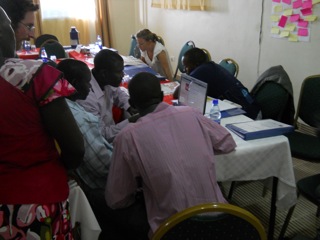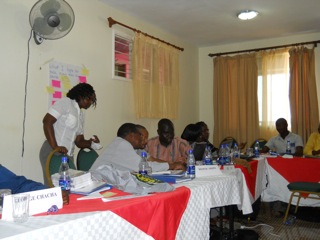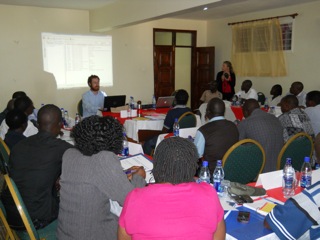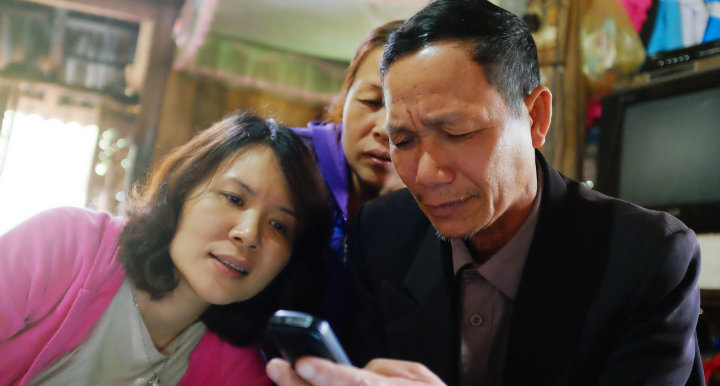 As Jordan and I wrap up our FrontlineSMS/Ushahidi training here in Kisumu, Kenya we picked up a number of valuable observations that can be borne in mind by others as they prepare their own projects using these pieces of software.
As Jordan and I wrap up our FrontlineSMS/Ushahidi training here in Kisumu, Kenya we picked up a number of valuable observations that can be borne in mind by others as they prepare their own projects using these pieces of software.
The first and most important is to plan your “work arounds”. During our preparatory afternoon the first day we arrived, FrontlineSMS worked on my MacBook Pro and Jordan’s Linux machine flawlessly. The first day of the training program, FrontlineSMS completely failed to work on the exact same machines using the exact same GSM modems, and the exact same FrontlineSMS download. This kind of failure could happen at any time, and that time will probably be when you need the software to be at it’s most efficient. We got around this by uploading Frontline onto a few other computers, testing it, and finding that the software seemed happiest running on a more bare-bones Windows-based machine. In an hour we went from having a serious problem to finding a solution that carried us through the next two days without any further complications. In the field, keep a few extra computers handy, be patient as you encounter hiccups, and as one of the participants advised, “approach the challenge knowing you will persevere.”
 The second observation, and probably one of the most important for those coming from low-context communication societies to work with teams from high-context communication societies, is that FrontlineSMS collects data not conversations. In low-context societies, communication is very direct to the topic at hand. In high-context societies, such as Kenya, communication is very deferential and values relationship building over direct discourse. When our participants first started out we had them do a recruiting exercise where they approached five “voters” and had to explain the Frontline system, how it would support the election process, and then ask for the “voters’” contact numbers. In the United States this interaction would take five minutes and involve direct questions. In Kenya, it took over 45 minutes the first time we practiced it, and at no point did a group ever tell the voters directly what they were doing or ask for their phone numbers. The lesson for those working in high-context societies is that practicing the recruitment stage of a FrontlineSMS deployment is as important as making sure everyone can use the software.
The second observation, and probably one of the most important for those coming from low-context communication societies to work with teams from high-context communication societies, is that FrontlineSMS collects data not conversations. In low-context societies, communication is very direct to the topic at hand. In high-context societies, such as Kenya, communication is very deferential and values relationship building over direct discourse. When our participants first started out we had them do a recruiting exercise where they approached five “voters” and had to explain the Frontline system, how it would support the election process, and then ask for the “voters’” contact numbers. In the United States this interaction would take five minutes and involve direct questions. In Kenya, it took over 45 minutes the first time we practiced it, and at no point did a group ever tell the voters directly what they were doing or ask for their phone numbers. The lesson for those working in high-context societies is that practicing the recruitment stage of a FrontlineSMS deployment is as important as making sure everyone can use the software.
The issue of high-context communication carries over into the action phase of a Frontline deployment as well. Helping the participants understand that the sharing of these SMS messages was a process of data exchange and not a conversation was critical to their eventual success in the election simulation. While pleasantries might be appropriate for a “thank you” SMS after someone agrees to participate in data collection, event reporting needs to be succinct and carefully formatted so that information managers can quickly parse and upload information to a map or redistribute it through SMS to a contact list. Working with participants to find ways to produce manageably sized messages that are culturally appropriate is a critical step in the deployment process.
The last phase, actually using the Frontline platform, was by far the easiest for us to address with the participants. They already had experience using computers and mobile phones, and in spite of the sometimes difficult nature of the Frontline software, they picked it up very quickly. The most important thing for a trainer is to let the students struggle a little bit; when they ask for help, talk them through it but leave them at the keyboard. While some participants struggled at first, their teammates often stepped in to help, and by the end of a round of voting, about thirty minutes, they had generally mastered the basics of creating groups, organizing messages, and managing the communication flow between their teammates and the voters. Struggle is good because it allows students to succeed, which breeds confidence and patience.
 Our training program in Kisumu, Kenya with Partnership for Peace was fantastic. As trainers there’s nothing more gratifying and energizing than seeing participants using the software successfully and being excited by what they are learning. Many of the participants had us install Frontline on their computers so that they could begin working with it in their home districts to manage smaller tasks such as public health and agricultural programs. These smaller programs will be used by the participants to trouble shoot, and build capacity in preparation for Kenya’s elections next August. We had a fantastic experience with this training program, and hope our lessons learned can be of help to other groups who are considering using FrontlineSMS software in their projects.
Our training program in Kisumu, Kenya with Partnership for Peace was fantastic. As trainers there’s nothing more gratifying and energizing than seeing participants using the software successfully and being excited by what they are learning. Many of the participants had us install Frontline on their computers so that they could begin working with it in their home districts to manage smaller tasks such as public health and agricultural programs. These smaller programs will be used by the participants to trouble shoot, and build capacity in preparation for Kenya’s elections next August. We had a fantastic experience with this training program, and hope our lessons learned can be of help to other groups who are considering using FrontlineSMS software in their projects.
If you’d like to know more about how to use these tools in your academic or professional work, consider taking our course Global Innovations for Digital Organizing: New Media Tactics for Democratic Change.


